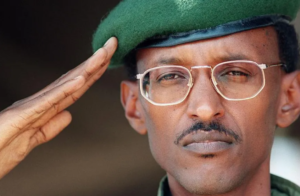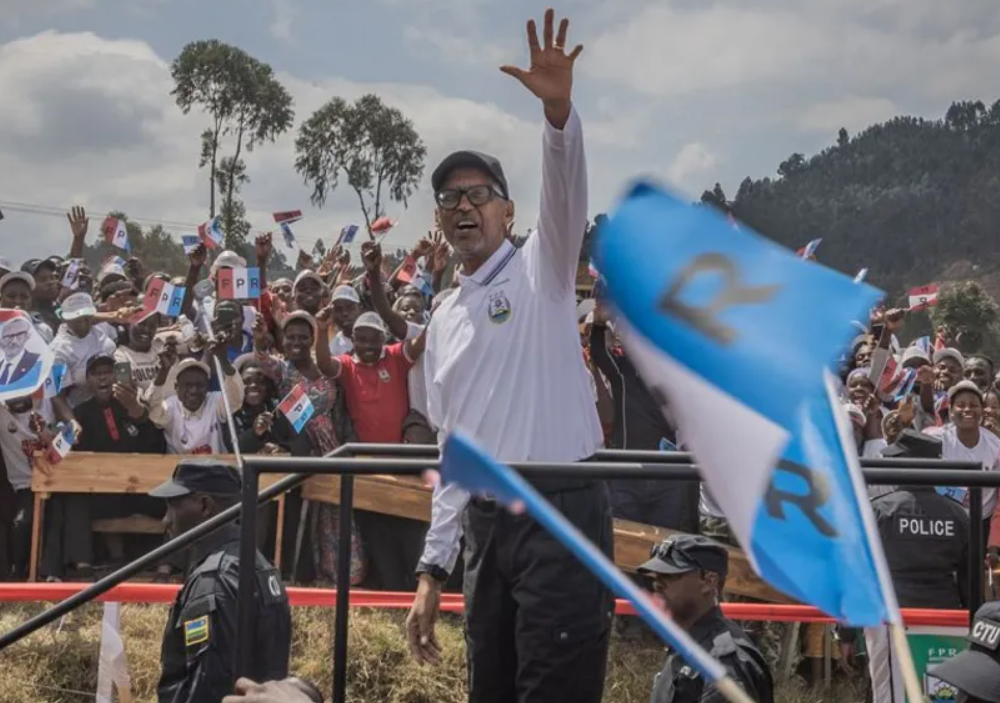The Rwandan Presidential Election: Paul Kagame’s Enormous Dominance
Paul Kagame, president of Rwanda, will have an easy time winning the next election after receiving nearly 99% of the vote in the last one. Some have questioned the legitimacy of these elections in light of his resounding successes in 2017, as well as his 95% victory in 2003 and 93% victory in 2010. The ex-refugee and rebel commander Kagame, though, confidently brushes off such criticism.
Kagame voiced his thoughts on the matter during a gathering in western Rwanda last month. “There are those who think 100% is not democracy,” he told the thousands of enthusiastic fans. “There are many who are voted in office with 15%…” he queried, alluding to elections globally. Could that be democracy? “How? ” As his followers shouted, “They should come and learn,” Kagame made it clear that he didn’t care about what happened outside of Rwanda.
Kagame, who is 66 years old and stands at nearly 6 feet (1.83 meters), has a formidable and commanding presence. He speaks with conviction, never sugarcoating anything, and his gentle, considerate tone grabs listeners’ attention. He makes sure his listeners get his hints even when he uses more esoteric language.
A Conflict-Framed Past
The ethnic strife between the Tutsi and Hutu peoples of Rwanda has had a profound impact on Kagame’s life. Citizens are now required by his government to identify as Rwandans, regardless of their ethnic affiliation simply. The leadership of Kagame’s rebel army began in July 1994, when they overthrew the Hutu extremist government that had been responsible for the massacre that year; he has been president since 2000. Following the genocide that killed 800,000 ethnic Tutsis and moderate Hutus, Kagame was instrumental in restoring peace and stability to Rwanda while serving as defense minister and vice president.

President Kagame’s rallies have attracted large crowds
Many people, especially politicians from the West, hold Kagame in high esteem for his part in bringing stability to Rwanda. But his rebel army is facing accusations of vengeance killings, which his administration denies, saying that the deaths were isolated events and that those responsible were punished. Despite his reputation for criticizing the West, Kagame has been known to seek its support, sometimes by playing on guilt over the inability to stop the massacre.
On One Side and the Other
University student Marie Jeanne steadfastly backs Kagame, saying that her safety as a student is directly related to his presidency. In spite of Kagame’s overwhelming popularity, two additional candidates—Democratic Green Party member Frank Habineza and independent Philippe Mpayimana—are on the ballot. These two received slightly more than one percent of the vote in the previous election. Although Diane Rwigara, a prominent personality in the opposition, was prevented from running, she asserts that this was due to reportedly missing paperwork, and other political parties have endorsed Kagame.
There are claims that Kagame has used jail and intimidation to stifle dissent. The purported murder of former South African intelligence chief Col. Patrick Karegeya in 2014 and other cross-border assassinations and abductions are allegedly linked to his network of spies. “You can’t betray Rwanda and not get punished for it,” Kagame said, refusing to disassociate himself from the murders.
Global and Regional Factors
Kagame has initiated military initiatives targeting Hutu rebel groups in the neighboring Democratic Republic of the Congo as a means of achieving security. Rwanda has always denied allegations that it provides support to the M23 rebel organization, even in the face of mounting evidence, including a recent UN study.

Backers of the Democratic Green Party’s Frank Habineza have been trying to drum up support for their candidate
According to Filip Reyntjens, a political scientist from Belgium, the national electoral commission is attributing votes instead of tallying them, and he bases this claim on findings from previous missions of observers from the European Union and the Commonwealth. Nevertheless, the Rwandan electoral commission asserts that its elections are “free, fair and transparent.”
A Rwandan parliamentary speaker currently living in exile in the United States, Dr. Joseph Sebarenzi, likens the election to a football game where the referee is also a player. Echoing Kagame’s belief that Rwanda’s political situation is distinct to its history and circumstances, he stresses the importance of every country’s setting.
Autobiography: A Climb to Power
It was because of ethnic conflict that Kagame, who was born in 1957, moved to Uganda when he was a little boy. These formative experiences shaped his fascination with espionage and military intelligence. In 1990, he led an army of Tutsi rebels into Rwanda after receiving training in the United States, Cuba, Tanzania, and Uganda. One aspect of Kagame’s plan for Rwanda is economic growth; he wants the country to follow the example of South Korea and Singapore. Experts agree that Rwanda’s technocratic leadership is competent, but they still worry that the government won’t be able to reach the middle-income mark by 2020.

Many Rwandans hold Kagame in high esteem, and it shows at his rallies when he draws huge crowds. By amending the constitution, he may be able to stay in power until 2034. According to Kagame, the Rwandan people, and not outsiders, should decide how long he should continue as president.
The political future of Rwanda is being closely watched as the election draws near. Although Kagame’s leadership has made progress and stability, there is still disagreement over the absence of political freedom and the presence of opposition. As this multi-faceted story develops, the world community keeps a careful eye on the progress made and the criticisms leveled.


















